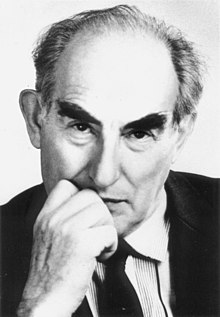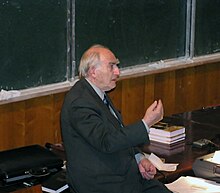Biography
Vitaly Ginzburg was born to a Jewish family in Moscow on 4 October 1916— the son of an engineer, Lazar Yefimovich Ginzburg, and a doctor, Augusta Wildauer who was a graduate from the Physics Faculty of Moscow State University in 1938. After attending his mother's alma mater, he defended his qualifications of the candidate's (Kandidat Nauk) dissertation in 1940, and his comprehensive thesis for the doctor's (Doktor Nauk) qualification in 1942. In 1944, he became a member of the Communist Party of the Soviet Union. Among his achievements are a partially phenomenological theory of superconductivity, the Ginzburg–Landau theory, developed with Lev Landau in 1950; the theory of electromagnetic wave propagation in plasmas (for example, in the ionosphere); and a theory of the origin of cosmic radiation. He is also known to biologists as being part of the group of scientists that helped bring down the reign of the politically connected anti-Mendelian agronomist Trofim Lysenko, thus allowing modern genetic science to return to the USSR.
In 1937, Ginzburg married Olga Zamsha. In 1946, he married his second wife, Nina Ginzburg (nee Yermakova), who had spent more than a year in custody on fabricated charges of plotting to assassinate the Soviet leader Joseph Stalin.
As a renowned professor and researcher, Ginzburg was an obvious candidate for the Soviet bomb project. From 1948 through 1952 Ginzburg worked under Igor Kurchatov to help with the hydrogen bomb. Ginzburg and Igor Tamm both proposed ideas that would make it possible to build a hydrogen bomb. When the bomb project moved to Arzamas-16 to continue in even more secrecy, Ginzburg was not allowed to follow. Instead he stayed in Moscow and supported from afar, staying under watch due to his background and past. As the work got continuously more classified, Ginzburg was phased out of the project and allowed to pursue his true passion, superconductors. During the Cold War, the thirst for knowledge and technological advancement was never-ending. This was no different with the research done on superconductors. The Soviet Union believed an the research done on superconductors would place them ahead of their American counterparts. Both sides sought to leverage the potential military applications of superconductors.
Ginzburg was the editor-in-chief of the scientific journal Uspekhi Fizicheskikh Nauk. He also headed the Academic Department of Physics and Astrophysics Problems, which Ginzburg founded at the Moscow Institute of Physics and Technology in 1968.
Ginzburg identified as a secular Jew, and following the collapse of communism in the former Soviet Union, he was very active in Jewish life, especially in Russia, where he served on the board of directors of the Russian Jewish Congress. He is also well known for fighting anti-Semitism and supporting the state of Israel.
In the 2000s (decade), Ginzburg was politically active, supporting the Russian liberal opposition and human rights movement. He defended Igor Sutyagin and Valentin Danilov against charges of espionage put forth by the authorities. On 2 April 2009, in an interview to the Radio Liberty Ginzburg denounced the FSB as an institution harmful to Russia and the ongoing expansion of its authority as a return to Stalinism.
Ginzburg worked at the P. N. Lebedev Physical Institute of Soviet and Russian Academy of Sciences in Moscow since 1940. Russian Academy of Sciences is a major institution where mostly all Nobel Prize laureates of physics from Russia have done their studies and/or research works.

